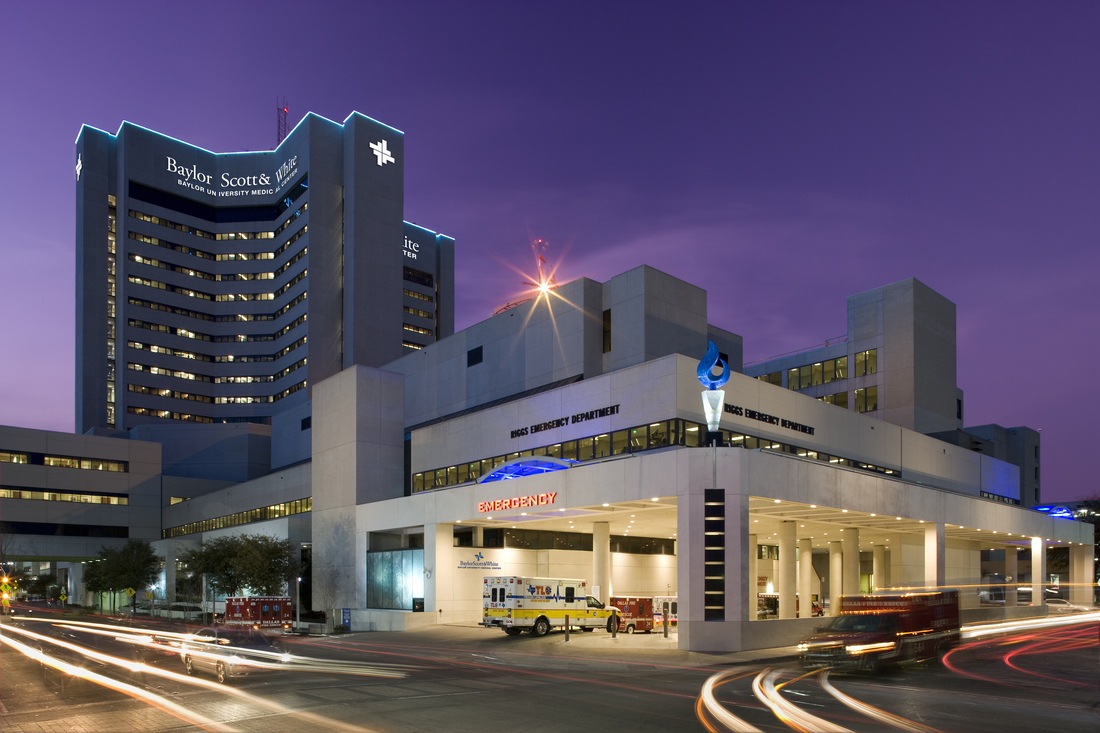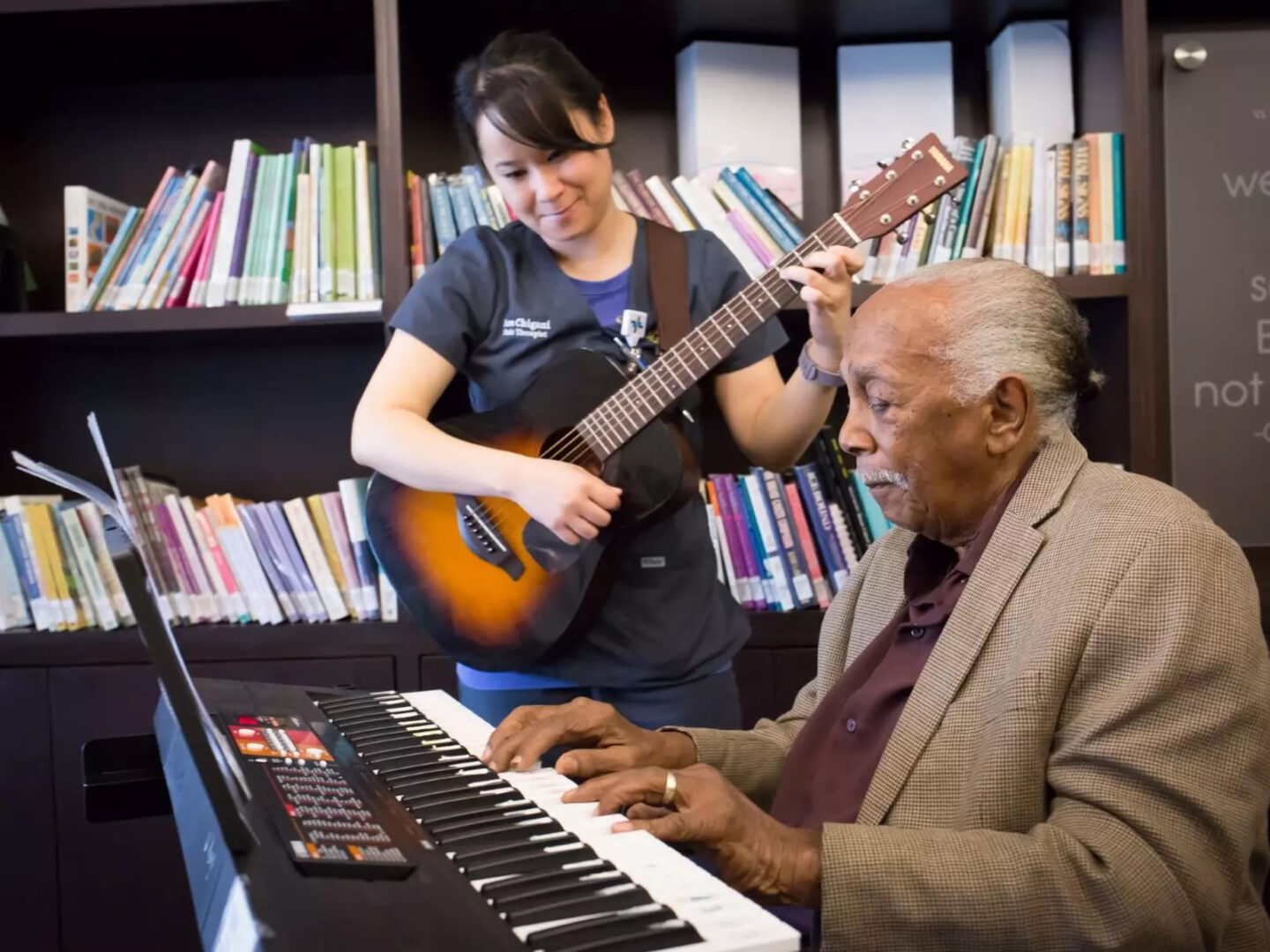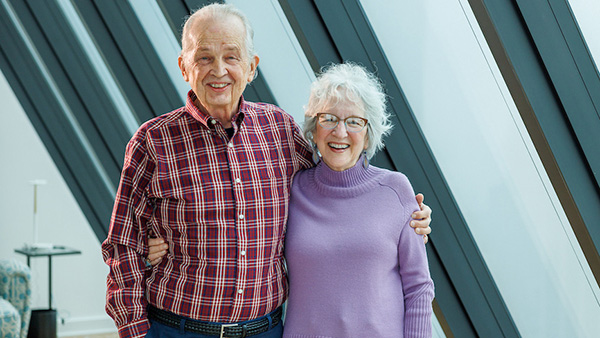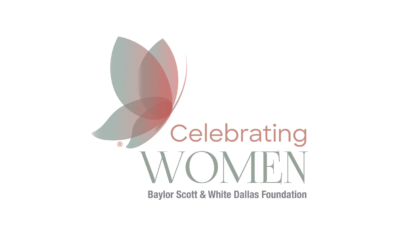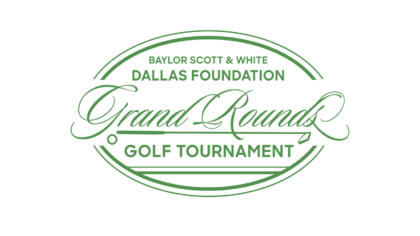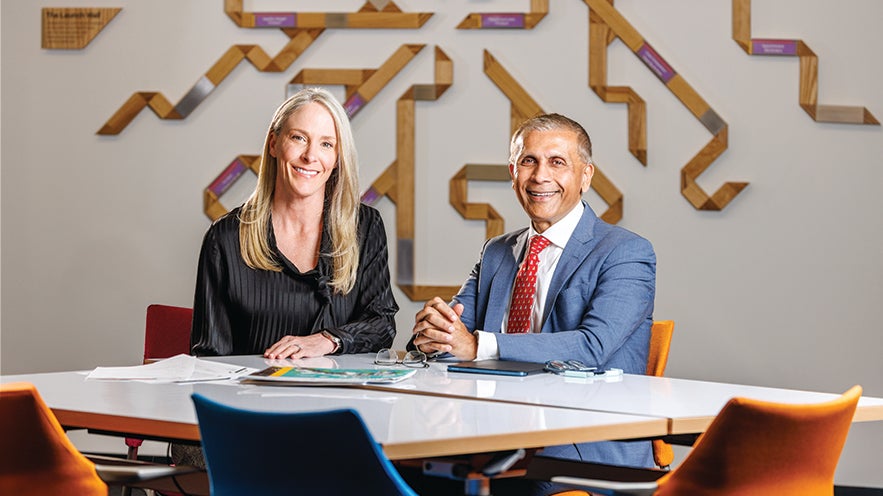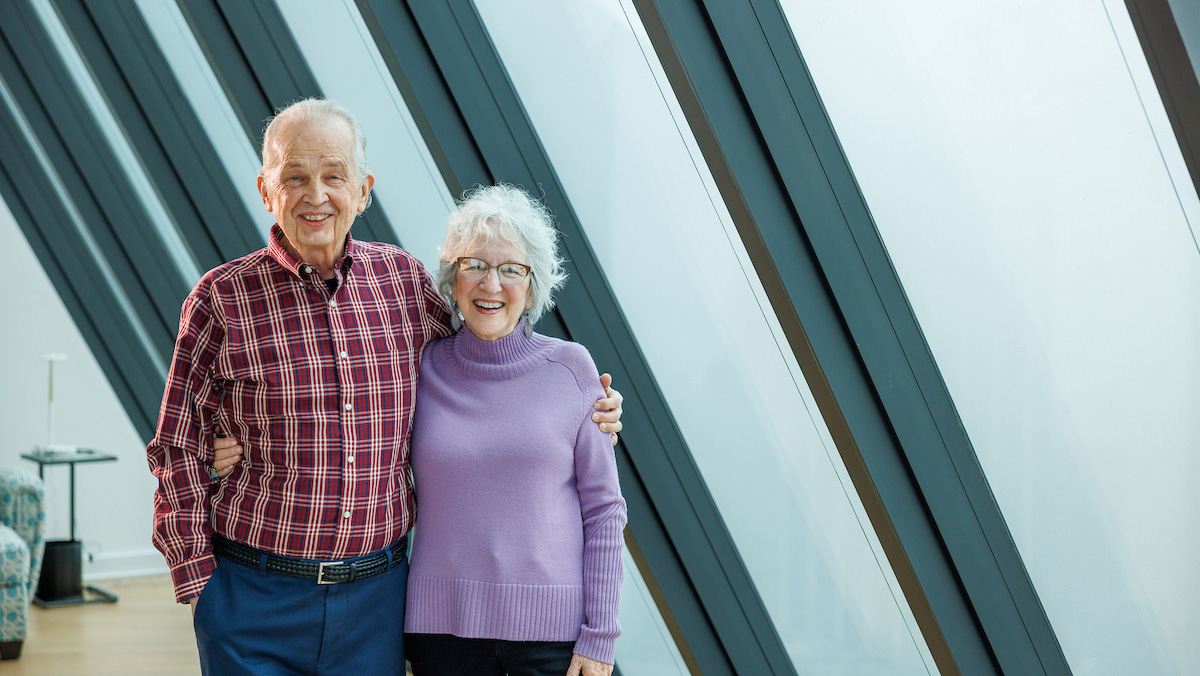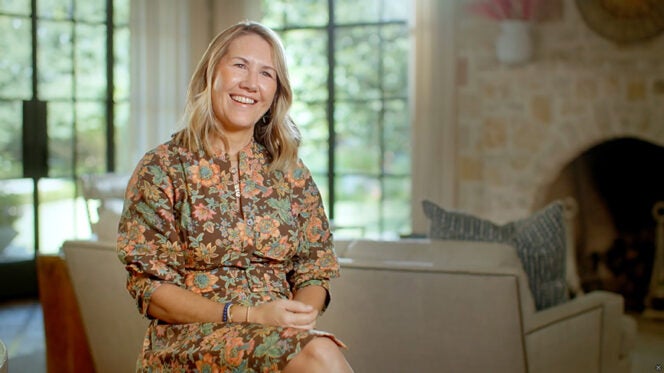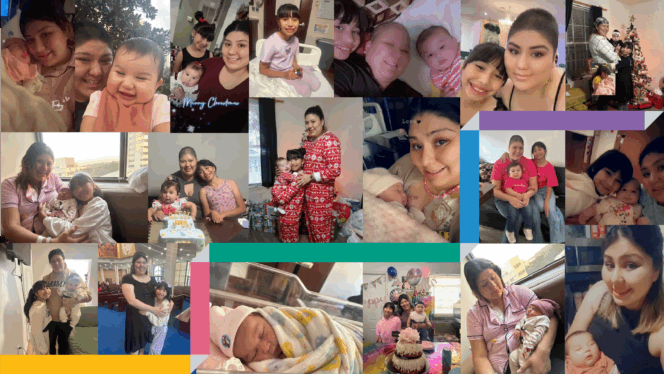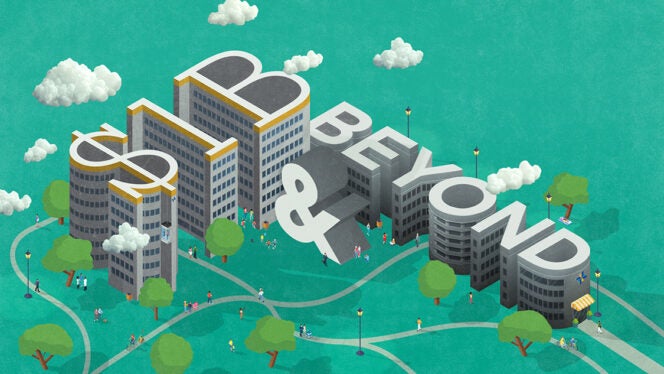Myra and Darwin Smiths’ generous gift will help expand access to genetic counseling and community health worker programs.
Myra Smith began her breast cancer journey by following the Stars. She got the diagnosis of triple negative breast cancer on January 2, 2019, and learned, thankfully, that it was caught in its early stages. Before she began treatment, she and her husband, Darwin, wanted to do something “wild and crazy,” but they weren’t sure what.
The Smiths found their answer when they checked the Dallas Stars schedule and saw the hockey team would be playing the Winnipeg Jets in just a few days. Myra and Darwin booked their tickets and hightailed it to Canada. “Darwin said, ‘We’re going to have fun. We’re going to make snow angels.’ And we did,” Myra recalled.
Genetics had a big impact on Myra’s life and journey. She and Darwin have such giving hearts—they really want just to help others as much as possible.
—Chelsey Brister
This January, Myra hit the five-year anniversary of her cancer diagnosis. Again, Darwin suggested they do something wild and crazy. Instead of another trip, Myra said, “I want my cancer-free celebration to be paying my good fortune forward.”
Paying it forward came in the form of two gifts to Baylor Scott & White Dallas Foundation: one to support genetic counseling, and the other supporting the community health worker program.
“The Smiths’ gift will allow Baylor Scott & White to reduce barriers for our underserved patients so they can receive the care and resources needed to live well, and it will expand genetic testing
and counseling for families facing a cancer diagnosis today, and in the future,” said Christina Goodman, vice president of development for the Baylor Scott & White Dallas Foundation. “Their commitment to giving back remains an inspiration to our team and so many others who are impacted by their generosity.”
Knowing her roots
One of Myra’s favorite shows is Finding Your Roots, a documentary TV series where the host explores the genealogy and family history of celebrity guests.
Myra is well versed in her own family’s history. Her ancestors are of Ashkenazi Jewish descent, a population known for having a higher prevalence of certain genetic diseases, including hereditary breast cancer.
When she was diagnosed with breast cancer, Myra shared her family history with her surgeon, Carolyn Thomas, MD, and oncologist, Joyce O’Shaughnessy, MD. Because of Myra’s family history, her physicians referred her to genetic counseling at Baylor Scott & White.
Two weeks after her diagnosis, the genetic counseling team shared the results of her genetic tests, which showed she has a rare genetic variant of the FANC-C gene.
“When somebody tests positive for a hereditary predisposition to breast cancer, usually it’s a mutation of a BRCA gene,” said Chelsey Brister, a certified genetic counselor at Baylor Scott & White and supervisor of the genetic counseling program.
“But we have found that there are many other genes associated with hereditary breast cancer that we can test patients for now. The FANC-C gene is one we’re still learning about.”
Researchers do know that having a certain variant of this gene elevates one’s risk of breast and pancreatic cancer, which is the third-leading cause of cancer deaths in the United States. It’s difficult to recognize the symptoms of pancreatic cancer in the early stages, and once the cancer spreads, survival rates are low.
Because of this, Myra received another referral, this time to the Familial Pancreatic Cancer Risk Assessment Program at Baylor Scott & White Charles A. Sammons Cancer Center, where she receives annual MRIs to proactively screen for the disease. “If something flags on any of these yearly visits, we can catch it earlier,” Chelsey said.
A major benefit of genetic testing is that it equips the patient and their family members with information to make more-informed decisions about their health. “Many patients come in because of their family history. They want to be proactive because they watched their family members go through a cancer diagnosis and want to try to prevent that from happening,” Chelsey said.
In 2023, the four-person genetic counseling team at Baylor University Medical Center saw more than 1,300 patients. The Smiths’ gift will expand the program’s impact by adding one genetic counselor and one assistant to the team—helping them serve an additional 800 patients per year.
“By adding more staff, we’re able to increase access and provide lifesaving care for patients who need this genetic information for themselves and their families too,” Chelsey said. “Genetics had a big impact on Myra’s life and journey. She and Darwin have such giving hearts—they really want just to help others as much as possible.”
Nature and nurture
Our identity is shaped not only by the genes we inherit but also by the legacies of our ancestors’ struggles and victories. Myra, a second-generation American, carries this understanding deeply.
All branches of Myra’s ancestors arrived in the U.S. in the early 1900s through Ellis Island as refugees. Despite starting their American journey as low-income craftsmen, Myra’s family narrative is one of overcoming adversity. Born in 1943, her early life was marked by her father’s service in WWII, leaving Myra and her mother to live in subsidized government housing.
Her partnership with Darwin, whom she met at Ohio State University and married in 1964, faced its own trials, from societal norms that forced her to leave her job upon pregnancy to the heartbreak of losing a daughter to congenital defects.
Overcoming these hardships, Myra and Darwin have forged a successful life, with Darwin building a career in banking and Myra dedicating her time to their two surviving daughters and volunteering, a passion she continued after their move to Dallas in 1988. Their experiences have instilled in them a deep sense of gratitude and a recognition of their fortunate position.
This awareness inspired Myra and Darwin to direct a portion of their gift to the community health worker (CHW) program at Baylor Scott & White. CHWs are the backbone of Baylor Scott & White’s community care program, which increases access to healthcare and improves health outcomes for medically underserved populations. Today, 18 CHWs at seven Baylor Scott & White Community Care Clinics assist physicians and other clinicians in providing care at no cost to more than 14,500 underserved patients each year across the Dallas/Fort Worth region.
The Smiths’ gift will fund a CHW role aimed at helping the underserved in a region of Dallas to overcome social determinants of health such as food insecurity, technology barriers and lower health literacy.
“Patients of our Community Care Clinics have not adopted technology in the same manner that other socioeconomic populations have,” said Jeffrey Zsohar, MD, medical director of BSW Community Care Clinics. “We foresee this as another kind of health disparity developing where, if we’re not working to engage our patients to use technology resources, then they will be further left behind.”
To address this, BSW has added a new CHW who has three primary responsibilities: help Community Care Clinic patients adopt the MyBSWHealth app; increase access to healthy food; and educate patients about healthy sleep habits, which leads to better overall brain health.
By helping patients download the MyBSWHealth app and understand how to navigate it, the CHW equips patients to take a more proactive role in their well‑being, for example, by accessing lab results, receiving appointment reminders or doing virtual doctor’s visits if they’re unable to attend an appointment in person.
“He teaches them how to send messages to their care team through the app. When patients stay engaged with us like this, it can help reduce hospital readmissions,” said Karla Alvarado, CHW manager at Baylor Scott & White.
The CHW also helps connect patients who have food insecurity to local food banks. He offers them directions to the food banks and brings donated foods from the facilities to Community Care Clinics so they’re easily available for patients.
“Because of the Smiths’ generosity in supporting this CHW role, we’re able to better empower the patient in how to navigate the resources that that we have in our community,” Karla said.
In reflecting over the last five years of her life, Myra said having cancer wasn’t a
bad thing. “It was a good thing because it got me to learn about my genes, and to monitor my pancreas. I gained a lot more than I lost.”
What she’s gained through her experience, she’s now sharing with so many more in North Texas. The Smiths’ contribution reflects a commitment to extending the support and opportunities that have been pivotal in their lives, ensuring others can navigate health challenges with greater ease and support.
How philanthropy expands access to genetic counseling
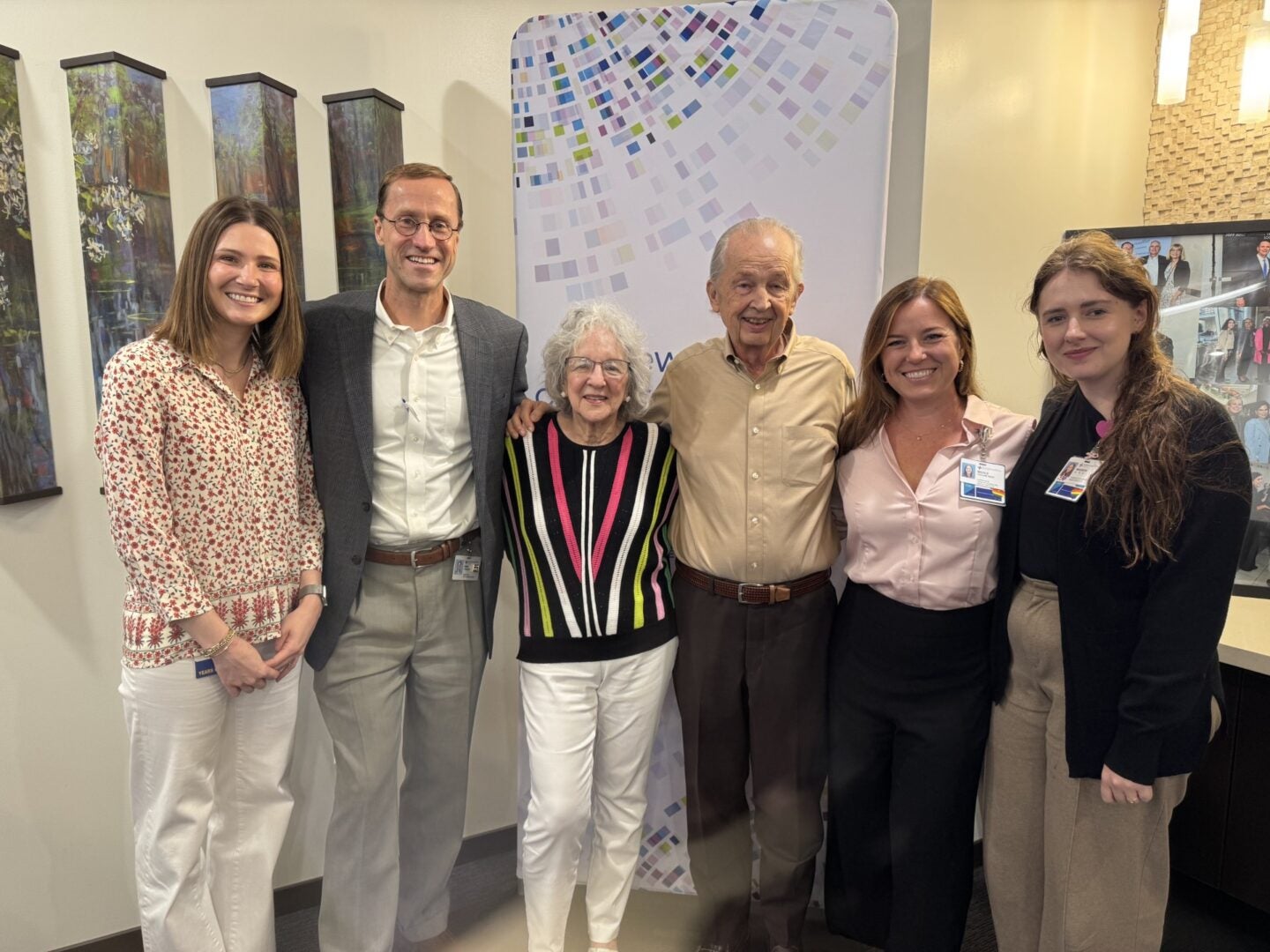
In August 2025, the Smiths visited the BSW genetic counseling team to see firsthand the impact of their generous support. They were thrilled to learn how their contributions have fueled the program’s growth over the past two years and enjoyed meeting our newest team members.
One of those team members, Madison Granier, joined as a Genetic Counselor in June 2024 — a position made possible thanks to the Smiths’ donation.
Madison has already provided compassionate care to nearly 400 patients in her first year, a powerful reflection of the lives being touched through philanthropy.
For more information about how you can support programs such as genetic counseling and community health workers at Baylor Scott & White, please contact Christina Goodman at 214.820.4408 or Christina.Goodman@BSWHealth.org.
